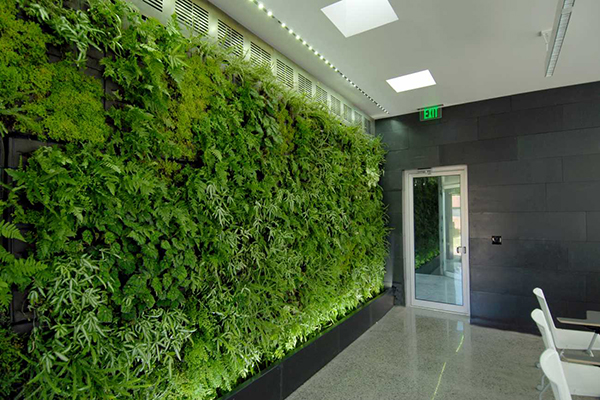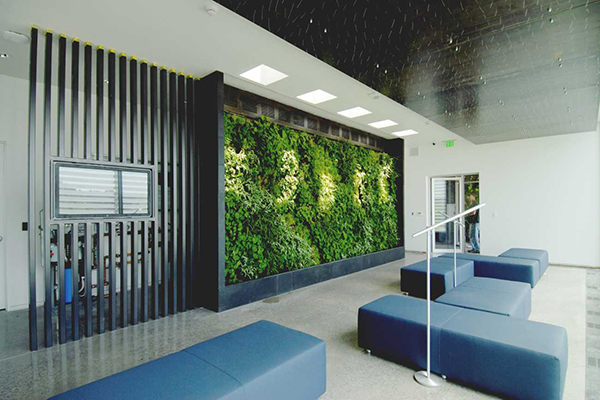The Center for Sustainability at Johnson County Community College (JCCC), Overland Park, Kansas, set aggressive goals for the College, including becoming a 100% renewable energy campus by 2050. This commitment affected every building project on campus, including Galileo’s Pavilion, a 3,000-square-foot academic building. Super-efficient practices and products, including Mitsubishi Electric Cooling & Heating Variable Refrigerant Flow (VRF) technology, have made Galileo’s Pavilion a true showcase of sustainability and earned LEED® Platinum certification.
The JCCC contacted Studio 804, a not-for-profit in Lawrence, Kansas, comprised of KU School of Architecture, Design and Planning graduate students. These students design and construct technologically sophisticated, green buildings under the direction of Dan Rockhill, distinguished architecture professor and Studio 804 founder. Rockhill said, “We designed Galileo’s Pavilion using our current knowledge of sustainable design. We took advantage of the daily and seasonal cycles of nature to passively cool, heat and daylight the building, as well as supply electricity and utility water.”
For HVAC, Rockhill said, “We had three distinctly separate spaces. Although they’re in the same building, the loading on them is different. So that resulted in three separate air-conditioning and heating solutions” – or, zoning. “We pride ourselves on promoting sustainable everything, so HVAC is no exception.” VRF was the clear choice.

Rockhill had been impressed with Mitsubishi Electric VRF on a recent project. “Mitsubishi [Electric] is a leader in its field. Many of the others follow, but Mitsubishi [Electric] developed the variable refrigerant concept. For Galileo’s Pavilion, we wanted the most technologically advanced equipment in the industry. So VRF and its capacity to simultaneously cool and heat all of the spaces within the building was a fit.”
He continued, “Mitsubishi [Electric] was also very generous in working on the engineering aspect of the Center for Design Research. Mitsubishi [Electric] gets passive solar, and gets that it’s the sum of the total of all the parts that makes the systems positive. And there was never any pushback from them. It was always, “Yeah, that’s great.”
“Installation went quite well. The Mitsubishi [Electric] units are compact and easy enough to install that the whole thing really was pretty simple,” said Rockhill.
“The school monitors the whole thing,” explained Michael Rea, JCCC’s sustainability project manager, “through our building automation system. The Mitsubishi [Electric] system is integrated so we can see humidity or change set points, for example.”
He continued, “Everything with the Mitsubishi [Electric] system has been going well. No compressor failures, no leaks, no fan problems, nothing. Our maintenance is easy, too – just changing the filters and making sure the condensers are clean.”
Another sign of success: LEED Platinum certification. Rea said, “For us in the Center, we were excited to get above Silver, our current standard. Galileo’s Pavilion is a showcase about what a sustainable building can be on a campus. We were also honored to receive the 2013 CSI Kansas City Chapter Innovation in Sustainability Award for the building.”
Related Stories
| Feb 25, 2011
Procter & Gamble will pursue LEED for all new sites globally
Procter & Gamble will pursue LEED certification for all new sites. P&G's Taicang plant in China - which is breaking ground today - is the first P&G manufacturing site to pursue LEED certification, with several additional new P&G sites currently working toward the same distinction globally.
| Feb 24, 2011
Perkins+Will designs 100 LEED Certified buildings
Perkins+Will announced the Leadership in Energy and Environmental Design (LEED) certification of its 100th sustainable building, marking a key milestone for the firm and for the sustainable design industry. The Vancouver-based Dockside Green Phase Two Balance project marks the firm’s 100th LEED certified building and is tied for the highest scoring LEED building worldwide with its sister project, Dockside Green Phase One.
| Feb 24, 2011
New reports chart path to net-zero-energy commercial buildings
Two new reports from the Zero Energy Commercial Buildings Consortium (CBC) on achieving net-zero-energy use in commercial buildings say that high levels of energy efficiency are the first, largest, and most important step on the way to net-zero.
| Feb 23, 2011
Financial outlook for green commercial properties is promising
Leanne Tobias, founder and managing principal of Malachite LLC, an advisory firm that specializes in the development, leasing, management, financing, and certification of sustainable or green real estate on a global basis, writes about new government policy proposals that have her cheering—and one that makes her gravely concerned.
| Feb 23, 2011
Unprecedented green building dispute could cost developer $122.3 Million
A massive 4.5 million-sf expansion of the Carousel Center shopping complex in Syracuse, N.Y., a project called Destiny USA, allegedly failed to incorporate green building components that developers had promised the federal government—including LEED certification. As a result, the project could lose its tax-exempt status, which reportedly saved developer The Pyramid Cos. $120 million, and the firm could be penalized $2.3 million by the IRS.
| Feb 23, 2011
Green building on the chopping block in House spending measure
Bryan Howard, Legislative Director of the U.S. Green Building Council, blogs about proposed GOP budget cuts that could impact green building in the commercial sector.
| Feb 22, 2011
LEED Volume Program celebrates its 500th certified Pilot Project
More than 500 building projects have certified through the LEED Volume Program since the pilot launched in 2006, according to the U.S. Green Building Council. The LEED Volume Program streamlines the certification process for high-volume property owners and managers, from commercial real estate firms, national retailers and hospitality providers, to local, state and federal governments.
| Feb 15, 2011
New 2030 Challenge to include carbon footprint of building materials and products
Architecture 2030 has just broadened the scope of its 2030 Challenge, issuing an additional challenge regarding the climate impact of building products. The 2030 Challenge for Products aims to reduce the embodied carbon (meaning the carbon emissions equivalent) of building products 50% by 2030.







